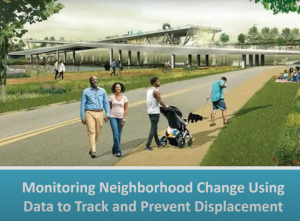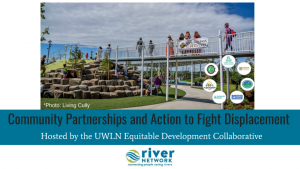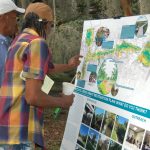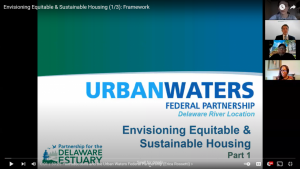
Since 2019, the Urban Waters Learning Network (UWLN) has been digging deeper into a topic that has long been a concern of UWLN members: the gentrification and displacement of people that we see taking place in our urban communities, oftentimes following efforts to revitalize and reinvest in the places we call home.
We are addressing these topics by surveying our network members and producing blog posts, webinars, impact stories, and other resources.
With four network leaders in 2020 and two additional in 2021, the UWLN formed the Equitable Development and Anti-Displacement Collaborative to further this work. The intention: convening a community of experts to listen, learn, and grow the body of research pertaining to equitable development resulting in additional resources for urban waters practitioners on the topics of gentrification, displacement, anti-displacement strategies, and community engagement. This work wouldn’t be possible without our amazing collaborative leaders: Arthur Johnson from the Lower Ninth Ward Center for Sustainable Engagement and Development; previously Daniel Wiley and currently Maria de Jesus of the Ironbound Community Corporation; Elizabeth Balladares, the Passaic River Urban Waters Federal Partnership Ambassador; Gloria McNair from Groundwork Jacksonville; and Lubna Ahmed from the State of Colorado Environmental Justice Unit.
If you are working at the intersection of urban waters and anti-displacement strategies, join our Mobilize group, an online communication platform where we connect and share resources and ideas related to equitable development.
Equitable Development 101 – Webinar Learning Series
 Understanding Gentrification and Displacement – The Path to Equitable Development
Understanding Gentrification and Displacement – The Path to Equitable Development
This recorded webinar frames the topics of gentrification and displacement and provides an example of the types of multi-sector partnerships that urban waters practitioners can create to ease displacement pressures. Presenters Paulina Lopez and Robin Schwartz from the Duwamish River Cleanup Coalition/TAG (Seattle, WA) share why this is an issue of concern and is one they are paying increasing attention to as a river-focused organization. Chris Schildt from PolicyLink addresses the drivers behind displacement, how gentrification and displacement are related and different, and policies and/or practices that can be enabled to ease displacement pressures. Exploring these topics further, Tony Defalco from Verde shares information about a multi-sector partnership called Living Cully. In the Cully neighborhood of Portland, Living Cully partners strive to balance environmental investments, equitable development, and anti-displacement goals.
Monitoring Neighborhood Change – Using Data to Track and Prevent Displacement
In this recorded webinar, the second in our Urban Waters Learning Network series on gentrification and displacement, we explore different ways data is being used by communities and decision-makers to understand displacement vulnerabilities, inform infrastructure investments and policies, predict areas at risk of gentrification and displacement, and assess equitable development plans.
Anti-Displacement Strategies: Environmental Restoration… Meet Affordable Housing
Building on the first 2 webinars in our series on gentrification and displacement that (1) defined the issues and (2) showed how to use data to track them, this webinar focuses on the most effective strategy to preventing displacement: protecting and expanding affordable housing.
Equitable Development 201 – A Deeper Dive into Anti-Displacement Strategies
Building Community Leadership as an Anti-Displacement Strategy
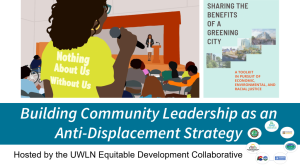 This recorded session examines the crucial role of advancing community education and building leadership to the development of anti-displacement strategies like preserving affordable housing and instituting other policies that keep communities in place. This panel-style discussion was moderated by two members of the Urban Waters Learning Network Equitable Development Collaborative – Arthur Johnson (Lower Ninth Ward Center for Sustainable Engagement and Development) and Liz Balladares (Passaic River Urban Waters Federal Partnership). Learn how community members in Newark, NJ and Houston, TX have advanced anti-displacement initiatives and equitable development policies from presenters Daniel Wiley of Ironbound Community Corporation (Newark, NJ) and Iris Gonzalez, Coalition of Environment Equity and Resilience or CEER (Houston, TX). Finally, Kate Derickson, with the CREATE Initiative, University of Minnesota, shares the Policy Toolkit: Sharing in the Benefits of a Greening City.
This recorded session examines the crucial role of advancing community education and building leadership to the development of anti-displacement strategies like preserving affordable housing and instituting other policies that keep communities in place. This panel-style discussion was moderated by two members of the Urban Waters Learning Network Equitable Development Collaborative – Arthur Johnson (Lower Ninth Ward Center for Sustainable Engagement and Development) and Liz Balladares (Passaic River Urban Waters Federal Partnership). Learn how community members in Newark, NJ and Houston, TX have advanced anti-displacement initiatives and equitable development policies from presenters Daniel Wiley of Ironbound Community Corporation (Newark, NJ) and Iris Gonzalez, Coalition of Environment Equity and Resilience or CEER (Houston, TX). Finally, Kate Derickson, with the CREATE Initiative, University of Minnesota, shares the Policy Toolkit: Sharing in the Benefits of a Greening City.
Community Wealth-Building as an Anti-Displacement Strategy
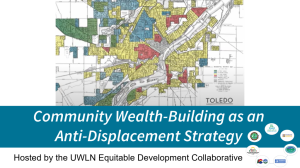 This recorded session examines the importance of building community wealth to help people stay in place and to advance equitable development initiatives. This panel-style discussion was moderated by members of the Urban Waters Learning Network Equitable Development Collaborative Arthur Johnson (Lower Ninth Ward Center for Sustainable Engagement and Development) and Alicia Smith (Junction Coalition). Presenters: Janet Hales (Advocates for Basic Legal Equality) and Kattie Bond-Hancock (Lucas Metropolitan Housing).
This recorded session examines the importance of building community wealth to help people stay in place and to advance equitable development initiatives. This panel-style discussion was moderated by members of the Urban Waters Learning Network Equitable Development Collaborative Arthur Johnson (Lower Ninth Ward Center for Sustainable Engagement and Development) and Alicia Smith (Junction Coalition). Presenters: Janet Hales (Advocates for Basic Legal Equality) and Kattie Bond-Hancock (Lucas Metropolitan Housing).
Community Partnerships and Action to Fight Displacement
Watch this peer exchange about community partnerships and actions to fight displacement which includes expert speakers–Cameron Herrington and Mayra Torres–from Living Cully, a multi-organization partnership based in Portland, OR. The speakers share information about the partnership as well as actions to preserve affordable housing and a proposed “Community-Led Development District” which aims to create a Tax Increment Financing (TIF) district in Portland’s Cully neighborhood to fund community-led projects. The peer call also includes a discussion between members of the Urban Waters Learning Network Equitable Development Collaborative and our speakers. Moderators: Arthur Johnson (Lower Ninth Ward Center for Sustainable Engagement and Development) and Lubna Ahmed (Groundwork Denver)
Policy Opportunities at the Intersection of Community Development and Urban Waters
 On Dec 9, 2021 the UWLN Equitable Development Collaborative hosted a peer exchange with representatives from Local Initiatives Support Corporation’s (LISC) policy team to share emerging policy opportunities at the federal level to promote affordable housing, economic development, and workforce development. LISC is a national community development organization that drives policy changes and targets investments to catalyze economic, health and safety for individuals and communities. LISC has a network of local offices in 38 cities and works in hundreds of urban communities across the U.S. Moderated by Gloria McNair (Groundwork Jacksonville); Presenters: Mark Kudlowitz and Michelle Harati (LISC’s Policy Team)
On Dec 9, 2021 the UWLN Equitable Development Collaborative hosted a peer exchange with representatives from Local Initiatives Support Corporation’s (LISC) policy team to share emerging policy opportunities at the federal level to promote affordable housing, economic development, and workforce development. LISC is a national community development organization that drives policy changes and targets investments to catalyze economic, health and safety for individuals and communities. LISC has a network of local offices in 38 cities and works in hundreds of urban communities across the U.S. Moderated by Gloria McNair (Groundwork Jacksonville); Presenters: Mark Kudlowitz and Michelle Harati (LISC’s Policy Team)
 Green Infrastructure and Gentrification: Harness the Benefits, Avoid the Displacement
Green Infrastructure and Gentrification: Harness the Benefits, Avoid the Displacement
Watch this session—hosted by the Urban Waters Learning Network Equitable Development and Anti-Displacement Collaborative on April 20, 2023—to hear more about the work that the Center for Neighborhood Technology (CNT) and the Green Infrastructure Leadership Exchange (GILE) are doing related to equitable green infrastructure implementation. Presenters: Jen McGraw (CNT), Barbara Hopkins (GILE), Jess Smith (Kitsap County Public Works), and Beatrice Ohene-Okae (DC Department of Energy & Environment)
Story Map: Equitable Development for Urban Waters: Understanding Gentrification and Preventing Displacement
New development projects in urban waters communities—like river restoration and the creation of greenspaces—are intended to create more sustainable and resilient communities; but the impacts often result in a reduced sense of belonging for long-time residents coinciding with an increase in property values that is followed by the displacement of surrounding communities. Equitable development, in this case, means greening without increasing displacement pressures on already stressed urban communities. There are some important key elements that make this work possible in urban waters settings.
Delaware River Urban Waters Federal Partnership Webinar Series: Envisioning Equitable and Sustainable Housing
This virtual series by the Partnership for the Delaware Estuary and the Delaware River Watershed Urban Waters Federal Partnership explored the state of equitable and resilient housing today, showcased local success stories, and provided a platform to bridge the gaps between communities and federal agencies so that our resources are maximized. The goal of this series was to emphasize the inclusion of collaboration and green solutions in equitably revitalizing our cities. The future can be full of green infrastructure, climate resilience, equitable accessibility, clean energy and transportation, and thriving ecosystems and economies if we connect the dots on these intersectional issues together.
Webinar 1: Framework
UWLN Equitable Development and Anti-Displacement Collaborative members–Gloria McNair (Groundwork Jacksonville) and Arthur Johnson (Lower 9th Ward Center for Sustainable Engagement and Development)–frame out the topic of equitable development and why it is important to center the community in development plans.
Also view the other two webinars in the series:
Additional Resources
See the UWLN Equitable Development Resources list for more.
Planning Documents
- Atlanta Beltline Equitable Development Plan
- The Junction-McClinton Nunn Choice Neighborhood Plan
- The Junction Neighborhood Master Plan (Toledo, Ohio)
- 11th Street Bridge Park – Equitable Development Plan by the 11th Street Bridge Park Equitable Development Task Force
Toolkits
- CREATE’s Sharing in the Benefits of a Greening City Toolkit
- What About Housing: A Policy Toolkit for Inclusive Growth by Grounded Solutions Network
- All-In Cities Policy Toolkit from PolicyLink
- High Line Network Best Practices Toolkit: Strategies and Tactics for Early-Phase Infrastructure Reuse Projects
Anti-Displacement Strategies
- Not in Cully: Anti-Displacement Strategies for the Cully Neighborhood by Portland State University
- Community Land Trusts and Community Development: Partners Against Displacement by Local Initiatives Support Coalition
- Pathway to Parks & Affordable Housing Joint Development by LA THRIVES and Los Angeles Regional Open Space and Affordable Housing Coalition
- Newark’s Rent Control Ordinance
- Newark’s Right to Counsel for Evictions Ordinance and initiative
- Greening Without Gentrification by the UCLA Institute of Environment and Sustainability and the University of Utah
- Inclusionary Zoning – What Does the Research Tell Us about the Effectiveness of Local Action?, an Urban Institute article
- Newark’s Inclusionary Zoning Ordinance
- Our Homes, Our Future report by PolicyLink
- Guide to Measuring Neighborhood Change to Understand and Prevent Displacement by the National Neighborhood Indicators Partnership
Other Resources
- Redlining (HOLC) maps and associated notes for communities across the U.S.
- Equitable Development and Urban Park Space by the Urban Institute
- Transformative Climate Adaptation in the United States: Trends and Prospects, by Linda Shi and Susanne Moser
- CEER’s leadership development programs on climate justice
- CEER’s Guidelines for Academic Partnerships
- Harris County Community Flood Resilience Task Force
- Harris County’s Home Buyout Program
- Confronting Disproportionate Impacts and Systemic Racism in Environmental Policy by Charles Lee
- Choice Neighborhood Programs – a program of the federal Dept. of Housing and Urban Development (HUD)
- The Community Reinvestment Act, which sets requirements for financial institutions in low-income neighborhoods
- “On the Path to Equitable Development: Partnerships Are Key to Combating Gentrification and Displacement” by Renee Mazurek
- The High Line Network, supporting a community of infrastructure reuse projects in creating vibrant and equitable public spaces
- NPR 1A Podcast: Can Cities Go Green without Driving Gentrification?

